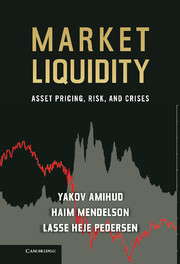Part I - The Effect of Liquidity Costs on Securities Prices and Returns
Published online by Cambridge University Press: 05 December 2012
Summary
Introduction and Overview
We begin by considering the direct effects of trading costs on the values of financial assets. Investors require compensation for the trading costs they pay when they buy or sell securities. If two assets generate the same cash flows over time but one of them is less liquid (has higher trading costs), rational investors will pay less for the less liquid asset, which costs more to trade. Consequently, the less liquid asset will have a lower value and a higher required (expected) return. Overall, we should observe that the returns on financial assets are increasing in asset illiquidity or transaction costs. Just as risk-averse investors require a higher return to compensate for a higher asset risk, we propose that investors require a higher return to compensate for greater asset illiquidity or transaction costs. The following chapters study these relations.
First, we address the meaning of illiquidity or trading costs. Stated simply, trading costs are the direct and indirect costs associated with trading a security. The most easily measured component of trading costs is the direct costs: brokerage fees, transaction taxes, and other trade-processing fees. In addition, there are search and delay costs that arise because the buyers and sellers of a security are not continuously available to transact, so a seller needs to search for buyers, especially if he or she needs to liquidate a large-size position and, similarly, a buyer needs to find sellers at the time he or she wants to buy. Another component of trading costs is the bid–ask spread. In securities markets with quoted bid and offer (ask) prices, which are the buying and selling prices, the buy transaction is naturally executed at a higher price than the sell transaction, resulting in a bid–ask spread. However, the bid and ask prices apply only to limited trade quantities. Larger transactions have a greater impact on the transaction price: They raise the buying price and lower the selling price, resulting in a market impact cost. The market impact cost is greater for larger-size transactions, when there is greater information asymmetry between the two parties in the transaction, and when there is greater friction in accessing the market by traders willing to trade.
- Type
- Chapter
- Information
- Market LiquidityAsset Pricing, Risk, and Crises, pp. 1 - 8Publisher: Cambridge University PressPrint publication year: 2012



